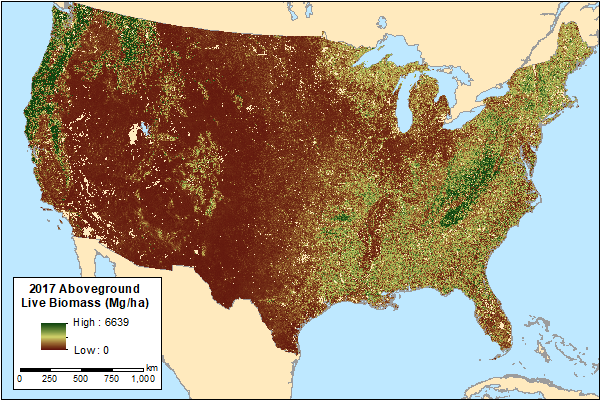The ORNL DAAC recently released this dataset from the Carbon Monitoring Systems (CMS) project by Yu, Y., et al., (2021):
Carbon Pools across CONUS using the MaxEnt Model, 2005, 2010, 2015, 2016, and 2017
This dataset provides annual estimates of six carbon pools, including forest aboveground live biomass, belowground biomass, aboveground dead biomass, belowground dead biomass, litter, and soil organic matter, across the conterminous United States (CONUS) for 2005, 2010, 2015, 2016, and 2017. Carbon stocks were estimated using a modified MaxEnt model. Measurements of pixel-specific site conditions from remote sensing data were combined with field inventory data from the U.S. Forest Service Forest Inventory and Analysis (FIA). Remote sensing data inputs included Thematic Mapper on Landsat 5, Operational Land Imager on Landsat 8, Moderate Resolution Imaging Spectroradiometer (MODIS) on Aqua, microwave radar measurements from Phased Array type L-band Synthetic Aperture Radar (PALSAR) on Advanced Land Observation Satellite (ALOS) and PALSAR-2 ALOS-2, airborne imagery from National Agriculture Imagery Program (NAIP), and the digital elevation model from the Shuttle Radar Topography Mission (SRTM). Data from satellite and airborne sources were co-registered on a common 100 m (1 ha) grid.
The NASA CMS program is designed to make significant contributions in characterizing, quantifying, understanding, and predicting the evolution of global carbon sources and sinks through improved monitoring of carbon stocks and fluxes. The System uses NASA satellite observations and modeling/analysis capabilities to establish the accuracy, quantitative uncertainties, and utility of products for supporting national and international policy, regulatory, and management activities. CMS data products are designed to inform near-term policy development and planning.
Additional data from Carbon Monitoring System (CMS) project and other relevant links can be found on the ORNL DAAC's CMS Project Page.
Citation: Yu, Y., S.S. Saatchi, B.F. Walters, S. Ganguly, S. Li, S. Hagen, L. Melendy, R.R. Nemani, G.M. Domke, and C.W. Woodall. 2021. Carbon Pools across CONUS using the MaxEnt Model, 2005, 2010, 2015, 2016, and 2017. ORNL DAAC, Oak Ridge, Tennessee, USA. https://doi.org/10.3334/ORNLDAAC/1752

